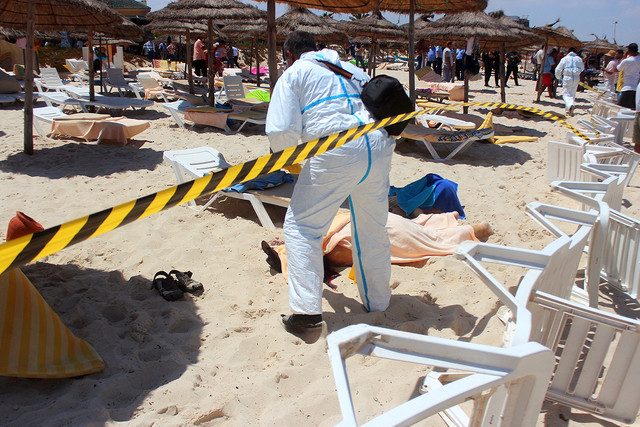SUMMARY
This is AI generated summarization, which may have errors. For context, always refer to the full article.

LONDON, United Kingdom – Three members of the same family were among at least 15 Britons killed in the Tunisia attack, reports said Sunday, June 28, in Britain’s worst loss of life in a terror incident since the 2005 London bombings.
As ministers warned the toll would likely rise, details began to emerge of those gunned down in Friday’s Islamist massacre at a popular beach resort.
Among the dead were reportedly 19-year-old student Joel Richards, his uncle Adrian Evans, 49, and his grandfather. Joel’s 16-year-old brother Owen survived.
Other victims were named as 24-year-old Carly Lovett and a couple in their 40s, Sue Davey and Scott Chalkley.
They were among at least 38 people from several countries killed in the attack in Port el Kantaoui near Sousse, about 140 kilometers (90 miles) south of Tunis.
Another 39 people were injured, including 25 Britons, in the attack which was claimed by the Islamic State group, which controls large parts of Iraq and Syria.
Announcing the 15 dead, Foreign Office minister Tobias Ellwood said the number “may well rise, as several more have been seriously injured in this horrific attack.”
Prime Minister David Cameron had earlier warned that Britain needed to prepare “for the fact that many of those killed in the attack were British.”
He condemned those responsible as “evil,” saying the victims were “innocent holidaymakers relaxing and enjoying time with their friends and families…they did not pose a threat to anybody.”
The attack represents the largest British loss of life in a terror incident since four suicide bombers blew themselves up on the London transport system on July 7, 2005, killing 52 people.
“This is the most significant terrorist attack on British people since 7/7 and highlights the ongoing threat of ISIL,” said Ellwood, whose own brother died in the 2002 Bali bombings.
Bringing home survivors
British police have sent forensic experts and detectives to Tunisia to help identify victims and gather evidence.
Officers were also interviewing survivors who flew home from the resort on Saturday, June 27, in particular looking for any phone footage taken of the incident.
About 20,000 British tourists were on package holidays in Tunisia at the time of the attack, according to ABTA, the country’s largest travel association.
Several travel firms laid on special flights to repatriate holidaymakers desperate to get home.
The TUI group, which includes Thomson and First Choice, sent ten planes on Saturday to repatriate 1,000 tourists and hopes to bring home a total of 2,500 by late Sunday.
Jet2, which has more than 1,000 customers on holiday in Tunisia, said it had repatriated 205 people and would send two further planes to collect more over the weekend.
Both companies cancelled their holidays to Tunisia for the coming week.
After returning home, Olivia Leathley described how she and her boyfriend heard grenades and gunfire and saw “hundreds of people running and screaming from the beach.”
“Somebody shouted, ‘They’re inside, run!’ We just ran as far away from the bullets as we could. It was all happening so quickly, it was deafening,” she told the BBC.
Security stepped up
The shooting was the second attack on tourists in Tunisia within 3 months, and came the same day as a bombing in Kuwait, which was also claimed by the IS group, and a suspected Islamist murder at a factory in France.
Cameron on Saturday chaired a meeting of the government’s Cobra emergency committee, while interior minister Theresa May was due to chair another meeting on Sunday.
After speaking to the leaders of Tunisia, France, Kuwait and Germany, Cameron tweeted: “Together, we’ll make sure terrorists do not win.”
Britain’s terrorism threat level is currently at severe, the second highest of five levels, meaning an attack is highly likely.
This remains unchanged but security was stepped up at major public events on Saturday, including armed forces day celebrations and London’s gay Pride march. – Rappler.com
Add a comment
How does this make you feel?
There are no comments yet. Add your comment to start the conversation.